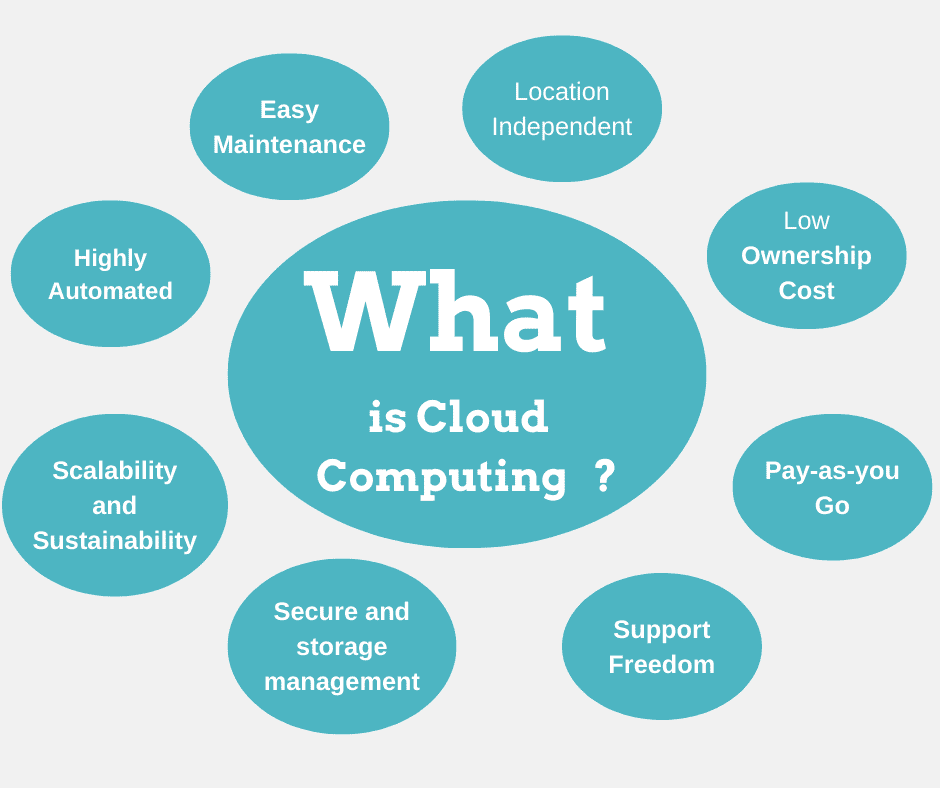Cloud computing is a term that describes the delivery of computing services and data over the internet. It is a model in which software applications and data are delivered through remote servers rather than individual workstations. The benefits of cloud computing include improved efficiency, lower costs, and better security.
As businesses increasingly rely on cloud-based applications and services, they need to understand the basics of cloud computing to make informed decisions about how to use it. In this article, we will provide an overview of cloud computing, discuss the different types of clouds, and explain the benefits and drawbacks of each. We hope this guide will help you better understand how cloud computing is changing the world and how you can take advantage of its advantages for your business.
What is Cloud Computing?
Cloud computing is one of the most recent and powerful technology forms that has revolutionized how companies do business. Cloud computing allows users to access their data and applications anytime. You no longer need to install software on your computer to work on your projects or access your data. Many people use cloud computing to store large files like music or photos. Cloud computing is also used for online banking, email, and scheduling tasks like cleaning or fixing a room.
What are the Benefits of Cloud Computing?
The benefits of cloud computing are many. First, it is extremely cost-effective. You can access your data and applications from anywhere without having to install software on your computer. This saves you time and money. Second, cloud computing is always available. You never have to worry about your data becoming unavailable due to a power or internet outage. Third, cloud computing provides users with instant access to their data. You don’t have to wait for your computer to start up before you can work on your project or access your data. Fourth, cloud computing eliminates the need for backups. With cloud computing, all your data is stored in one location, so you.
How Cloud Computing Works
Cloud computing is a way to use the internet to save money and time. You can use it to store your files, get online access, and work on them from any computer. You do not have to worry about buying or setting up new hardware or software. You can also use cloud computing to share information with other people.
Cloud Computing Benefits for Businesses
Cloud computing has been around for over a decade, but its impact on business is only now being realized. Here are the top five benefits of cloud computing for businesses:
- Reduced Costs: Cloud computing platforms generally provide lower costs than on-premises solutions, which can save businesses money.
- Increased flexibility: With cloud computing, businesses can move their applications and data between platforms without worrying about infrastructure changes or storage issues.
- Improved security: With cloud-based services, businesses can take advantage of more robust security measures than traditional software solutions.
- Easier collaboration: With easy access to data and applications from any device, employees can work together more effectively in a cloud-based setting.
- Improved customer service: With customers’ data residing in the cloud and always accessible, businesses can provide better customer service by monitoring problems as they happen instead of waiting for customers to reach out.
Cloud Computing Security Concerns and Solutions
Cloud computing is a rapidly growing technology that allows users to access files, applications, and services over the internet. However, cloud computing presents several security concerns that businesses must address. This article will discuss some of the most common security concerns with cloud computing and provide solutions.
- Data Security One of the most important concerns regarding data security is ensuring your data is safe from unauthorized access. With cloud storage, you risk exposing your data to third-party attacks if it is not properly protected. One way to protect your data is to use encryption software to encrypt data before it is sent to the cloud. Additionally, you can use centralized storage providers with in-house security measures. Suppose you do not have any reliable security measures in place. In that case, you should consider using a third-party provider, such as Amazon Web Services (AWS) or Microsoft Azure, who offer reliable security measures.
- Cybersecurity Risks Another major concern with cloud computing is cybersecurity risks. Cybersecurity threats are becoming increasingly sophisticated, and businesses must take precautions to protect their data from attack. One way to protect yourself against cyberattacks is to use virtual private networks.
The Future of Cloud Computing
Cloud computing is quickly becoming the norm for businesses of all sizes. The benefits of cloud computing are clear: flexibility, cost savings, and rapid deployment. But what is cloud computing, and how does it work? In this complete guide to cloud computing, we will explain everything you need to know about this growing trend in business.
First, let us define what cloud computing is. Cloud computing is a model for delivering services over the internet. Companies can run their operations without investing in or managing their hardware or software. Rather than having a company own and manage the hardware and software needed to run its operations, companies rent access to these resources from a third-party provider (known as a cloud provider).
The benefits of using a cloud provider are clear: flexibility, cost savings, and rapid deployment. With a cloud provider, companies no longer need to worry about investing in expensive hardware or software infrastructure. Instead, they can rent space on the provider’s servers. This means that companies can quickly deploy new applications or services without having to spend valuable resources upfront.
In addition to being flexible and cost-effective, cloud computing also has one.
Conclusion
Cloud computing is quickly becoming one of the most important technologies. Businesses of all sizes are starting to realize the benefits that cloud computing can provide, and they are rapidly adopting it to improve their efficiency and agility. This article will look at cloud computing, why businesses should adopt it, and some of its key benefits. I hope you have found this guide helpful, and if not, be sure to check back soon, as we will update it regularly with new information and tips on how to best use cloud computing in your business.
















